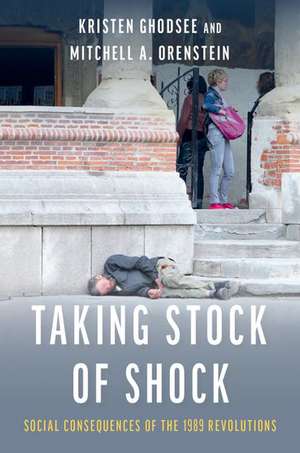Taking Stock of Shock: Social Consequences of the 1989 Revolutions
Autor Kristen Ghodsee, Mitchell Orensteinen Limba Engleză Paperback – 29 sep 2021
Kristen Ghodsee and Mitchell A. Orenstein blend empirical data with lived experiences to produce a robust picture of who won and who lost in post-communist transition, contextualizing the rise of populism in Eastern Europe. After the fall of the Berlin Wall in 1989, more than 400 million people suddenly found themselves in a new reality, a dramatic transition from state socialist and centrally planned workers' states to liberal democracy (in most cases) and free markets. Thirty years later, postsocialist citizens remain sharply divided on the legacies of transition. Was it a success that produced great progress after a short recession, or a socio-economic catastrophe foisted on the East by Western capitalists?Taking Stock of Shock aims to uncover the truth using a unique, interdisciplinary investigation into the social consequences of transition—including the rise of authoritarian populism and xenophobia. Showing that economic, demographic, sociological, political scientific, and ethnographic researchproduce contradictory results based on different disciplinary methods and data, Kristen Ghodsee and Mitchell Orenstein triangulate the results. They find that both the J-curve model, which anticipates sustained growth after a sharp downturn, and the "disaster capitalism" perspective, which posits that neoliberalism led to devastating outcomes, have significant basis in fact. While substantial percentages of the populations across a variety of postsocialist countries enjoyed remarkable success,prosperity, and progress, many others suffered an unprecedented socio-economic catastrophe. Ghodsee and Orenstein conclude that the promise of transition still remains elusive for many and offer policy ideas for overcoming negative social and political consequences.
| Toate formatele și edițiile | Preț | Express |
|---|---|---|
| Paperback (1) | 181.66 lei 3-5 săpt. | +16.91 lei 7-11 zile |
| Oxford University Press – 29 sep 2021 | 181.66 lei 3-5 săpt. | +16.91 lei 7-11 zile |
| Hardback (1) | 542.71 lei 3-5 săpt. | +22.53 lei 7-11 zile |
| Oxford University Press – 29 sep 2021 | 542.71 lei 3-5 săpt. | +22.53 lei 7-11 zile |
Preț: 181.66 lei
Nou
34.76€ • 36.30$ • 28.70£
Carte disponibilă
Livrare economică 25 martie-08 aprilie
Livrare express 11-15 martie pentru 26.90 lei
Specificații
ISBN-10: 0197549241
Pagini: 300
Dimensiuni: 236 x 158 x 18 mm
Greutate: 0.44 kg
Editura: Oxford University Press
Colecția OUP USA
Locul publicării:New York, United States
Recenzii
Ghodsee has teamed up with political scientist Mitchell Orenstein to present a comprehensive survey of all the evidence that things have gotten worse for Eastern Europe since 1989
Taking Stock of Shock results from a massive interdisciplinary endeavor, and it is a timely and crucial contribution to the debate on postsocialism. Knocking down disciplinary walls, Ghodsee and Orenstein provide a uniquely broad insight into the post-socialist landscape. This is more than merely a scholarly achievement. Building a compelling new narrative is crucial to help break down the walls of inequality and precarity that limit the actual exercise of the freedoms post-socialist citizens nominally gained when the Berlin Wall fell.
Ghodsee and Orenstein have written a provocative book. Drawing on an impressive array of economic, demographic, public opinion, and ethnographic data, they critically analyze the emergence of stark inequalities that have generated tremendous hardships for many and enormous benefits for some.
From a starting point of cacophony, where different disciplines and data seem to depict the post-Soviet transition as either a grand success or an absolute failure, Ghodsee and Orenstein seam together a convincing narrative where both achievements and disappointments can coexist. The book's focus on widening inequality allows reconciling these opposing views and providing crucial insights not only for scholars of transition countries but also for observers and policymakers in other regions
This book is highly recommendable not only for the richness of data presented but also the provocative analysis, which helps to unsettle self congratulatory accounts of the "triumph of the West." East Europeans do not like inequality and unfairness, and their voices need to be heard.
This extraordinary book is a thorough assessment of the post-communist transitions in twenty-nine nations of the region, written by two scholars, Kristen Ghodsee and Mitchell A. Orenstein, representing the antipodes of the methodological spectrum. Ghodsee is a cultural anthropologist whose qualitative ethnographic approach highlights the idiosyncratic nuances of the communities under investigation. Orenstein is a political scientist specializing in quantitative research in political economy on a societal and cross-national level. Each became a renowned authority in their respective fields long before they coupled their scholarly efforts at the University of Pennsylvania. Congratulations to Penn for poaching them from other fine institutions!
Notă biografică
Kristen R. Ghodsee is Professor of Russian and East European Studies and a Member of the Graduate Group in Anthropology at the University of Pennsylvania. Her articles and essays have been translated into over twenty languages and have appeared in publications such as The New Republic, The Lancet, Ms. Magazine, The Washington Post, and The New York Times. She is also the author of nine books, mostrecently: Second World, Second Sex and Why Women Have Better Sex Under Socialism, which has already had thirteen foreign editions.Mitchell A. Orenstein is Professor and Chair of Russian and East European Studies and a Senior Fellow of the Foreign Policy Research Institute. He is the prize-winning author, editor, and co-author of eight books on the social policy and political economy of postcommunist states, including From Triumph to Crisis, Privatizing Pensions, and Roma in an Expanding Europe. He has consulted for the World Bank, USAID, and thegovernment of Slovakia.
